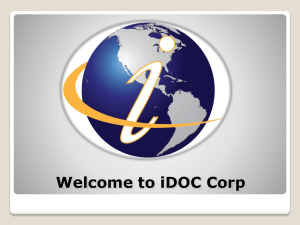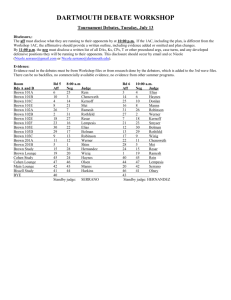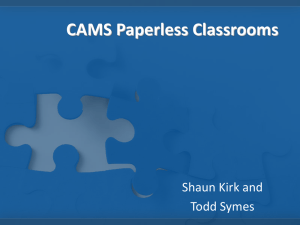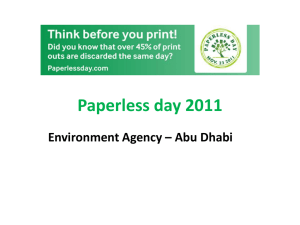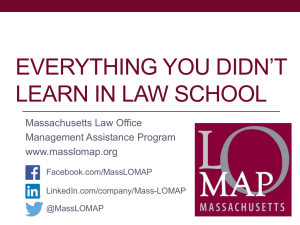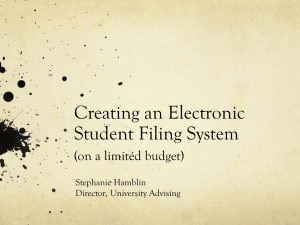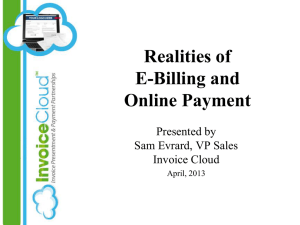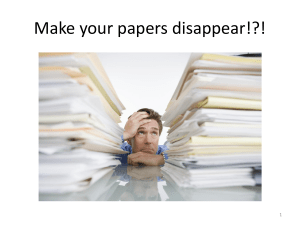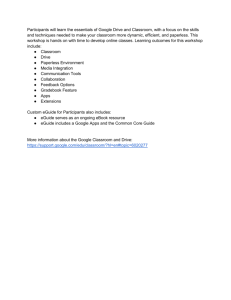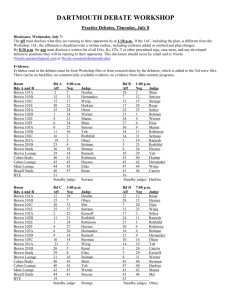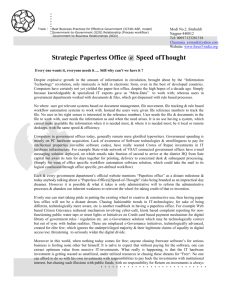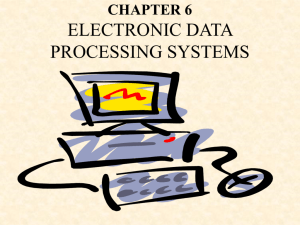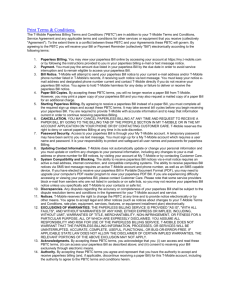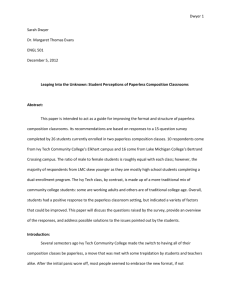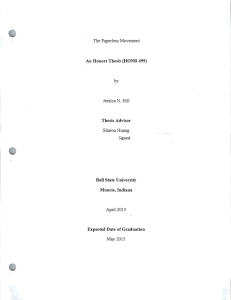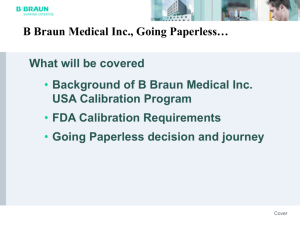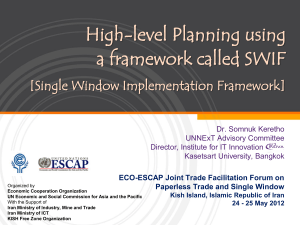ACHIEVING A PAPERLESS OFFICE
advertisement
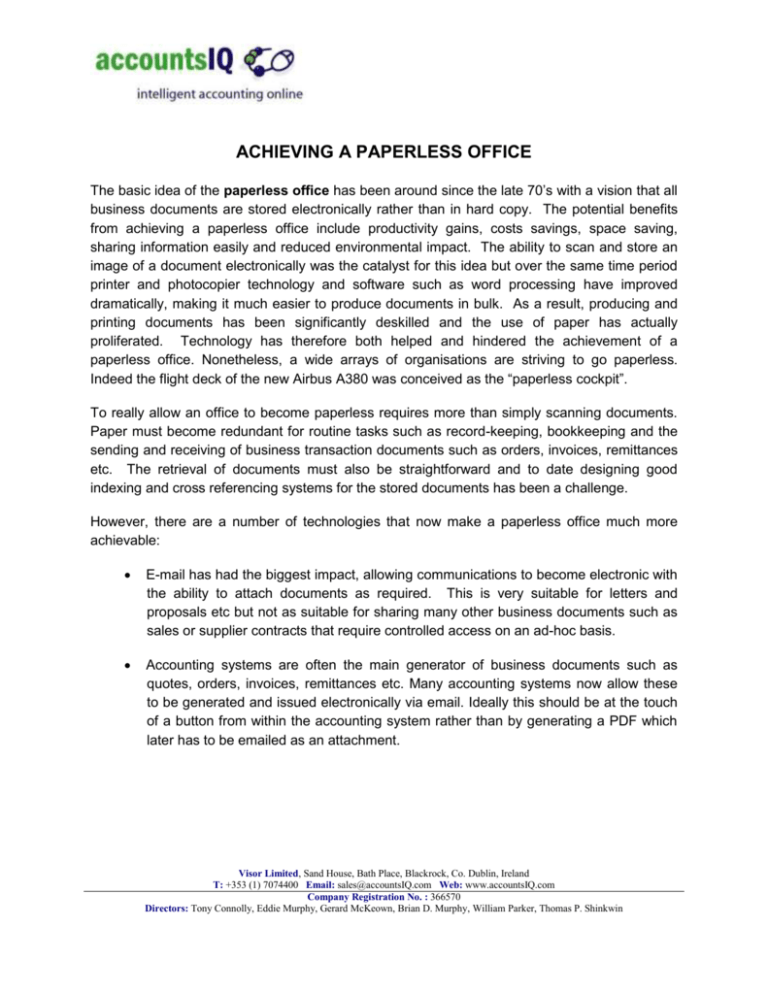
ACHIEVING A PAPERLESS OFFICE The basic idea of the paperless office has been around since the late 70’s with a vision that all business documents are stored electronically rather than in hard copy. The potential benefits from achieving a paperless office include productivity gains, costs savings, space saving, sharing information easily and reduced environmental impact. The ability to scan and store an image of a document electronically was the catalyst for this idea but over the same time period printer and photocopier technology and software such as word processing have improved dramatically, making it much easier to produce documents in bulk. As a result, producing and printing documents has been significantly deskilled and the use of paper has actually proliferated. Technology has therefore both helped and hindered the achievement of a paperless office. Nonetheless, a wide arrays of organisations are striving to go paperless. Indeed the flight deck of the new Airbus A380 was conceived as the “paperless cockpit”. To really allow an office to become paperless requires more than simply scanning documents. Paper must become redundant for routine tasks such as record-keeping, bookkeeping and the sending and receiving of business transaction documents such as orders, invoices, remittances etc. The retrieval of documents must also be straightforward and to date designing good indexing and cross referencing systems for the stored documents has been a challenge. However, there are a number of technologies that now make a paperless office much more achievable: E-mail has had the biggest impact, allowing communications to become electronic with the ability to attach documents as required. This is very suitable for letters and proposals etc but not as suitable for sharing many other business documents such as sales or supplier contracts that require controlled access on an ad-hoc basis. Accounting systems are often the main generator of business documents such as quotes, orders, invoices, remittances etc. Many accounting systems now allow these to be generated and issued electronically via email. Ideally this should be at the touch of a button from within the accounting system rather than by generating a PDF which later has to be emailed as an attachment. Visor Limited, Sand House, Bath Place, Blackrock, Co. Dublin, Ireland T: +353 (1) 7074400 Email: sales@accountsIQ.com Web: www.accountsIQ.com Company Registration No. : 366570 Directors: Tony Connolly, Eddie Murphy, Gerard McKeown, Brian D. Murphy, William Parker, Thomas P. Shinkwin In addition, accounting documents generated outside the system can now be scanned and stored against the relevant transaction, account or product. This includes purchase invoices, proof of delivery, sales contracts, supplier contracts, pricelists etc. In this case the key is to be able to use the accounting system as the mechanism for retrieval rather than having to separately come up with an indexing system – thus the accounting system itself becomes the indexing and retrieval system. Internet banking allows payments to be made on line and statements to be received electronically. Good accounting systems link directly to Internet Banking so that the workflow of determining what has to be paid, paying it electronically and reconciliation and synchronisation with banking records is seamless. This represents potential for significant cost savings as processing cheque payments can cost £s including postage and other costs but electronic payments cost pence. In terms of information sharing, the ability to store on the Internet in encrypted format means that documents are always available where you need them from anywhere. Traditionally this is achieved from constant photo copying of hard copy documents or sending whole files to, for example, accountants/auditors. Access to emails and accounting systems and related documents via the web makes sharing documents much easier without requiring hard copies. The paperless office is now considered to be a philosophy to work with minimal paper and convert all forms of documentation to a digital form. Whilst a fully paperless office may be difficult to achieve, the technologies outlined above are now readily and cost effectively accessible to all businesses and therefore a “less paper” office is easily achieved. Although the paperless office is not yet a widespread reality, a myth it is not and businesses need to embrace the benefits it can bring. Visor Limited, Sand House, Bath Place, Blackrock, Co. Dublin, Ireland T: +353 (1) 7074400 Email: sales@accountsIQ.com Web: www.accountsIQ.com Company Registration No. : 366570 Directors: Tony Connolly, Eddie Murphy, Gerard McKeown, Brian D. Murphy, William Parker, Thomas P. Shinkwin
